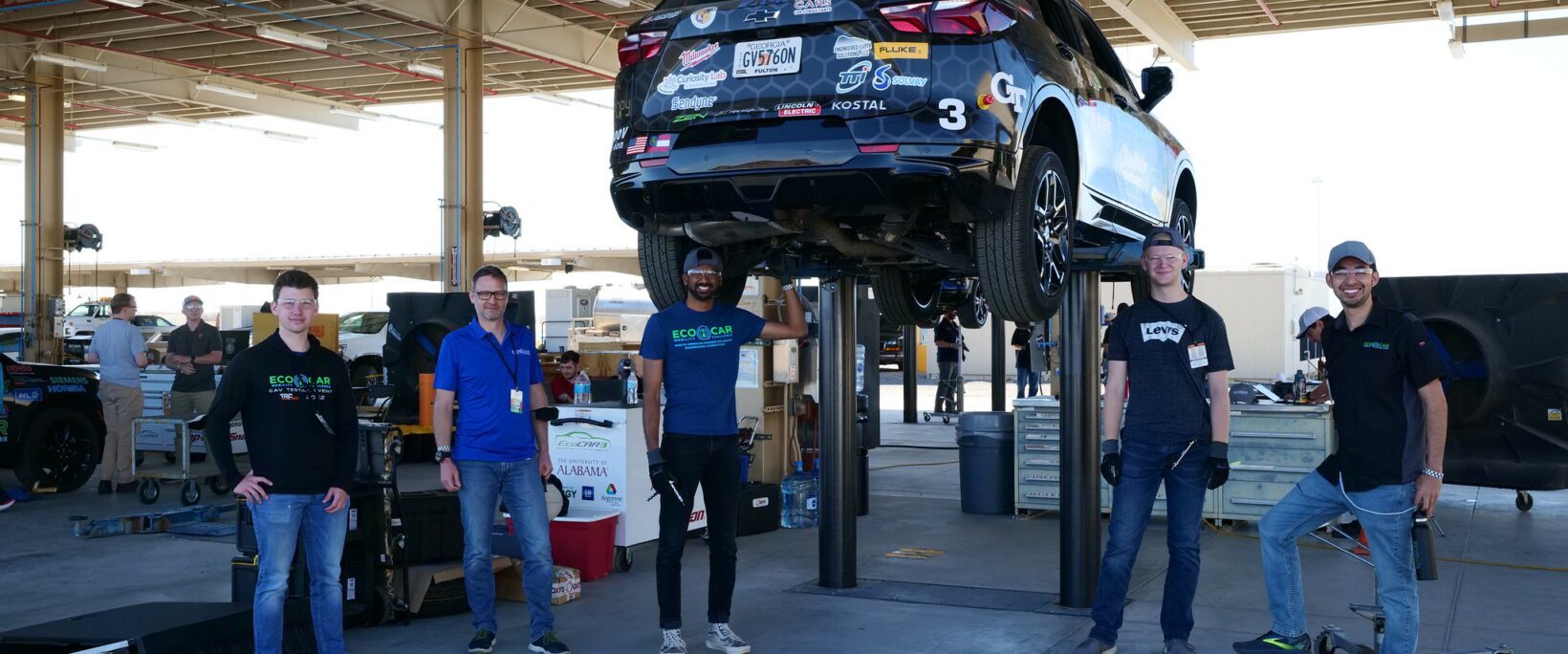
Students
Are you looking participate in the ultimate educational engineering experience?
With EcoCAR, you are participating in a high-profile, hands-on project where you’re following real-world processes and working in an interdisciplinary environment. This experience fuels your resume to help you get wherever you want to go.
With a multi-disciplinary approach, students of all majors are welcome to join the EcoCAR EV Challenge.
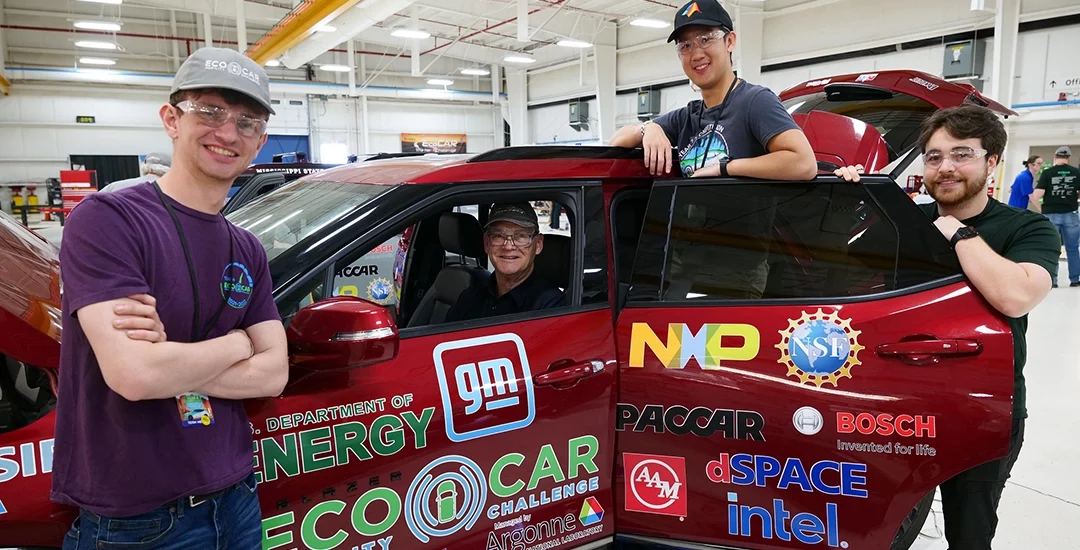

What do AVTCs offer Students?
A key mission of AVTCs is to provide student enrichment and education through experiential learning and supplemental training. Students gain hands-on, real-world experience in the areas of engineering, business, and communications.
The EcoCAR EV Challenge offers the following to participants:
- Hands-on, project-based learning
- Partnership with seasoned industry mentors and SMEs
- Real-world Global Vehicle Development Process projects
- Access to state-of-the-art testing facilities
- Leadership and management opportunities
- 6 Graduate Research Assistant funded positions
Benefits of Competing in AVTCs
The overall vision of EcoCAR is to provide an opportunity for university students to participate in hands-on automotive R&D at the leading edge of technology by using contemporary industry standards and practices.
- Participation in a high-profile, hands-on project that mimics an automotive start up environment
- Interdisciplinary collaboration with the university that broadens your knowledge and expertise
- Unparalleled, experiential learning experience for students
- Opportunities to gain real-world leadership skills: teamwork, collaboration, and problem-solving skills; verbal and non-verbal communication; business and communications acumen
- Funded graduate and undergraduate student support and travel to workshops and competitions
- Top jobs with North America’s premier employers (EcoCAR graduates command higher starting salaries than their peers, $4K-15K/average depending upon degree)
- Access to state-of-the-art testing facilities
- Research opportunities and publications
- Experience with a real-world vehicle development process and learn industry best practices, tools, standards and methods to prepare you for future careers in the mobility industry
- Close collaboration with mobility leaders from industry and government
- Research opportunities and publications
Each EcoCAR team will be comprised of sub-teams with different sets of goals, skillsets, and deliverables in order to achieve the overall goals of the competition.
Project Management (PM)
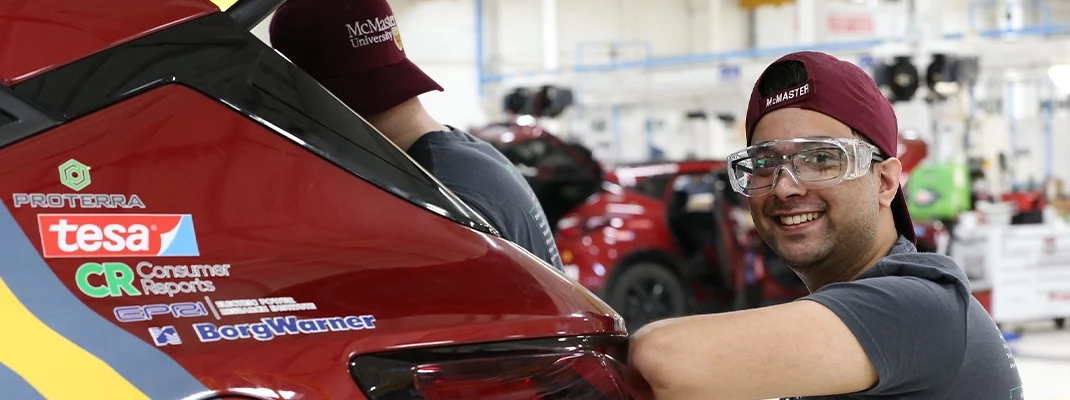

What is it?
The Project Management Subteam, led by the Project Manager, define organizational processes, create project plans, provide project oversight, and assert authority to monitor & control the execution of project tasks.
What Do Students Work On?
The PM subteam works very closely with the Lead Faculty Advisor to plan, execute, and manage all competition deliverables and requirements, and to ensure the team can operate efficiently and align with business and automotive industry practices is a competition-funded graduate engineering student who serves in a key management role for the overall team.
What's the Importance?
The PM subteam will not only develop the overall project timeline and work plan but is responsible for tracking and executing all project-level activities, knowledge transfer, and recruiting and retention activities. The PM will also work with the Lead Faculty Advisor, College of Engineering staff, and the rest of their student team to manage all local sponsorship and fundraising activities.
Skills Gained
- Agile Management Techniques
- Critical Path Identification
- Conflict Resolution
- Peer-to-Peer Management
- Stakeholder identification and management
Majors
- Graduate Engineering Program (MSME, MSEE, etc.)
- Engineering Management
- Industrial Engineering
- MBAs with an engineering undergrad or dual major
Careers
- Program Managers
- Project Managers
- Sales Engineering
- Senior Leadership
- Engineering Manager
Communications Management (CM)


What is it?
The Communications Management Subteam oversees communications and outreach activities for each individual EcoCAR Team. The Communications Manager (CM) will lead all group activities for this Sub Team.
What Do Students Work On?
Students in the CM subteam will write standard communications plans, develop program key messages, plan and host events, educate local youth grades K-12 on Science Technology Engineering and Math (STEM), manage government relations, and maintain social media. Communications students will gain invaluable experience through these activities that align with industry practices for standard communications programs.
What's the Importance?
The CM subteam will enhance the visibility of Advanced Vehicle Technology Competitions (AVTCs), the EcoCAR EV Challenge and individual EcoCAR teams. This subteam will Promote the benefits of advanced vehicle technologies and highlight team achievements through creative writing/ blogging, social media, and local events.
Skills Gained
- Management and leadership
- Strong presentation skills
- Ability to learn, understand and communicate advanced vehicle technologies
- Public Relations
- Event Planning
- Social Media
- Video Production
Majors
- Various majors and skillsets are welcome to participate in the Communications sub-team!
- Public Relations
- Journalism
- Communication Technology
- Strategic Communication
- Human Communication or Interpersonal Communication
- Digital Media and Journalism
- Graphic Design (to assist with content and graphic development)
- Education Majors (to assist with youth outreach and activity development)
Careers
- Communications Specialist or Strategist
- Communications Coordinator
- Social Media Manager
- Event Planner
- Journalist
- Public Relations Specialist
Equity in Mobility (EiM)
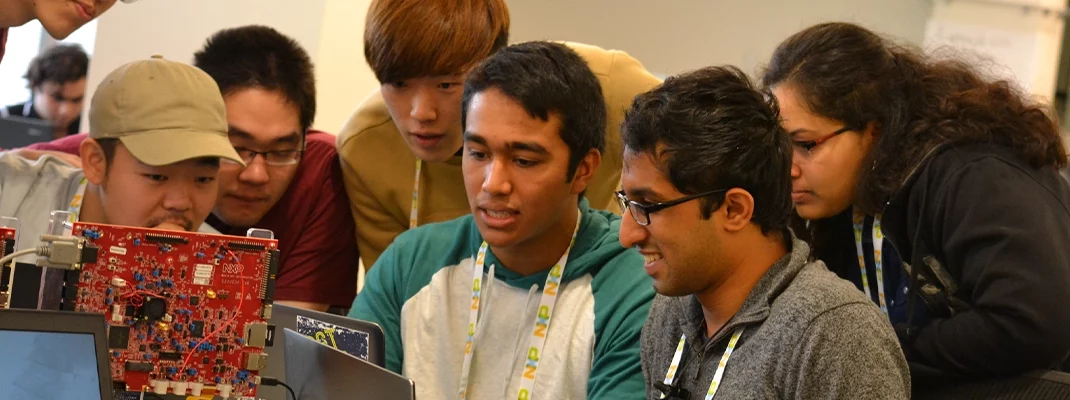

What is it?
The Equity in Mobility Challenge tasks teams with developing innovative solutions to North American’s most challenging systemic inequities in mobility and infrastructure. Students will educate themselves on local mobility challenges and develop project proposals in partnership with the community to address these issues.
Students in this Subteam will work to increase representation in STEM, understand & address mobility inequities and foster an inclusive team environment that allows everyone to contribute, grow and thrive in the program.
What Do Students Work On?
Over the four years of the competition, students will learn how to develop and implement DEI initiatives on a team while also conducting community-engaged research to tackle mobility inequities.
What's the Importance?
EcoCAR students are the future leaders of mobility in North America. The DEI Subteam seeks to educate all students on how to build clean energy mobility solutions and opportunities for all. Students participating in this subteam will learn the best practices for implementing DEI initiatives in a team setting and establishing metrics to measure progress of these initiatives. They will also learn to problem solve through an equitable and accessible lens in our Equity in Mobility technical challenge. Overall, this track will help develop well-rounded and inclusive leaders in mobility.
Skills Gained
- Equitable problem solving
- Written & verbal communication
- Ability to identify underserved & overburdened communities
- Best practices in recruiting, retention, and leadership development
- Data collection and analysis
- Ability to distill technical concepts into digestible content for different audiences
Majors
All majors and skillsets are welcome to participate in the DEI sub-team! To have a successful DEI sub-team, you will need diverse perspectives from many different majors including those not pursuing careers in STEM.
Non-Engineering Majors strategically beneficial for DEI Track / Equity in Mobility:
- Psychology
- Industrial Psychology
- Human Factors & Ergonomics
- Political Science
- Anthropology
- Public Policy
- Public Administration
- City & Regional Planning
Careers
Potential Careers Opportunities:
- Any position where you work with or lead a team of individuals
- Additional Roles (If you need specifics):
- Diversity, Equity, and Inclusion (DEI) Manager
- Program Manager
- Project Manager
- City & Regional Planners
- Urban Planners
- Any engineering careers
- Roles in DOE’s EERE and VTO offices
- Researcher at the National Laboratories like Argonne
Connected and Automated Vehicle (CAV)
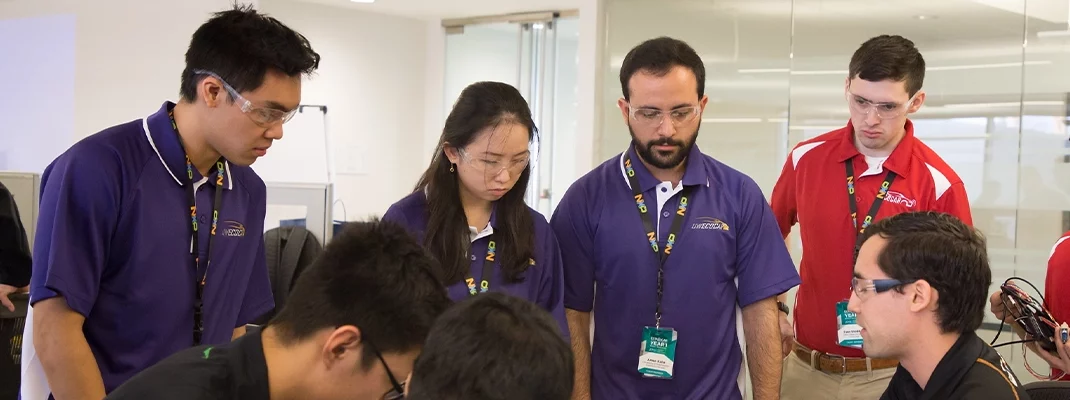

What is it?
The Connected and Automated Vehicle (CAV) subteam will be a multidisciplinary group of students leading the development of the connected and automated driving features. The features will include connected adaptive cruise control, automatic lane centering, traversing connected corridors, and optimizing vehicle controls for energy efficiency.
What Do Students Work On?
Connected and Automated Vehicles have the capability to vastly improve the efficiency of transportation, reduce congestion, and completely eliminate accidents. Since this technology is still in development, the CAV subteam in EVC will directly contribute to making CAVs become a reality in our world in the near future.
The CAVs students will be working on the full stack of autonomy software and hardware. The technical areas include raw image and lidar data processing, sensor fusion, object tracking, lane localization, Simultaneous Localization And Mapping (SLAM), motion controls, behavioral planning, and simulation.
What's the Importance?
Connected and Automated Vehicles have the capability to vastly improve the efficiency of transportation, reduce congestion, and completely eliminate accidents. Since this technology is still in development, the CAV subteam in EVC will directly contribute to making CAVs become a reality in our world in the near-future.
Skills Gained
- Matlab / Simulink
- Programming / Code development
- RTMaps
- Computer vision
- Sensor data processing
- Machine Learning / Artificial Intelligence
- Software Development
- Sensor fusion
- Control systems
- Modelling and simulation
- Git
- Sensor Integration
- CAN communications
Majors
- Electrical Engineering
- Computer Engineering
- Computer Science
- Mechanical Engineering
Careers
Potential Careers Opportunities:
- Software Engineer
- Software Developer
- Machine Learning Engineer
- Data Scientist
- Autonomous Systems Engineer
- Robotics Engineer
- Self-Driving Car Engineer
Propulsion Controls and Modeling (PCM)
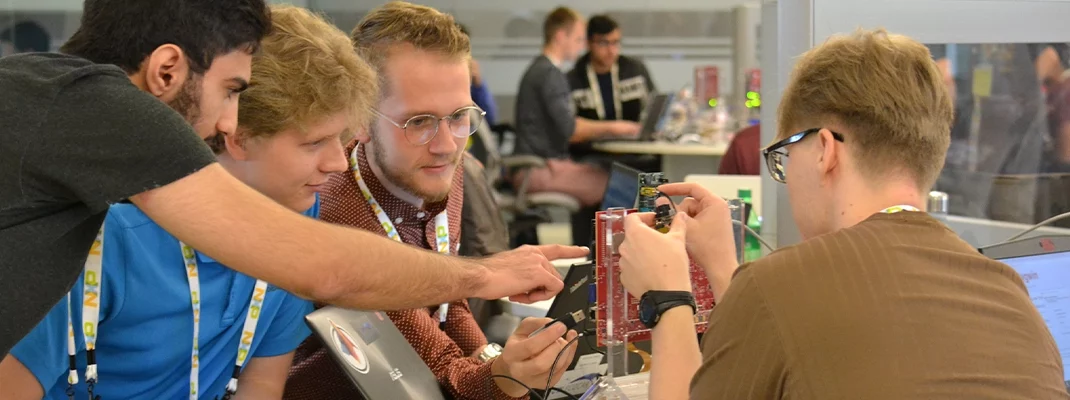

What is it?
The Propulsion Controls and Modeling (PCM) subteam is responsible for designing and developing the propulsion controls for their electric vehicle. The controls development process involves using software development and modeling techniques to design a system that is optimized for performance and energy efficiency.
What Do Students Work On?
Students will be working in MATLAB/Simulink to design their propulsion controls algorithm and how it interfaces with the rest of the vehicle. They will also model their controls system performance using model-in-the-loop and hardware-in-the-loop testing, before eventually engaging in vehicle testing to evaluate performance.
What's the Importance?
Propulsion controls is crucial to the vehicle in that it controls all of the devices that put torque to the wheels. Not only does the PCM team design a system that can efficiently drive the vehicle but establishes the interfaces for how other systems other than the driver (ie. CAVs) may command torque.
Skills Gained
- MATLAB/Simulink
- Git – version control software
- Software development processes
- Simulation based testing
- Vehicle based testing
- Data processing
Majors
- Mechanical Engineering
- Electrical Engineering
- Computer Science
- Computer Engineering
Careers
Potential Careers Opportunities:
- Controls Engineer (not just automotive, controls is everywhere!)
- Calibration Engineer
- Test Engineer
- Modeling Engineer
- Scripting and Tools Developer
System Design and Integration (SDI)
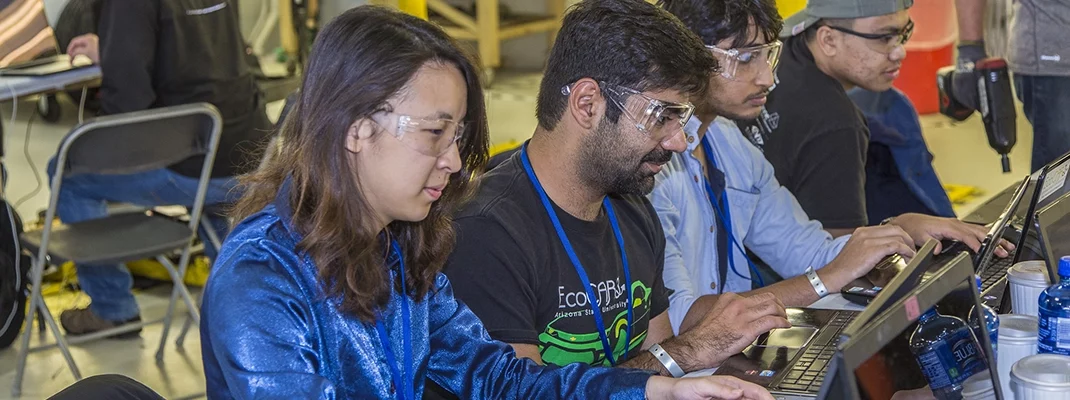

What is it?
The System Design and Integration (SDI) Subteam, is responsible for the design, integration, evaluation, and refinement the propulsion systems and components to ensure the vehicle functions as intended while maintaining safety for all planned competition events.
What Do Students Work On?
The SDI subteams will follow an iterative design process, exploring different material properties, packaging, and wire routing strategies to achieve the desired safety, operation, and serviceability for their team design components.
What's the Importance?
The SDI subteam works with the PCM and CAV subteams to establish component and system requirements ensuring that the components selected for their vehicle architecture not only meet their vehicle targets in simulation, but can be effectively packaged, powered, and monitored in the competition donated Cadillac LYRIQ.
The SDI subteam has a large role and emphasis in Years 1 and 2 of the competition when component packaging, electrical schematic and diagram planning, and thermal system design are core development tasks. In Years 3 and 4, the SDI subteam will have a minimal role in core development tasks as the focus is more on vehicle level refinement and calibration activities.
Skills Gained
- CAD Space Claim and Component Packaging
- Component Mount Design and Manufacture
- Structural Analysis
- Mass Management and Light-Weighting
- Power Distribution
- High-Voltage and Low-Voltage System Design and Integration
- Thermal System Design and Integration
- Vehicle Dynamics
Majors
- Mechanical Engineering
- Electrical Engineering
- Industrial Engineering
- Graduate Engineering Program (MSME, MSEE, etc.)
Careers
Potential Careers Opportunities
- Structural Engineer
- Automotive Engineer
- Vehicle Calibrator
- Product Designer
No Upcoming EcoCAR EV Challenge Events. Please Check back soon!
Want to get involved?
Interested in learning more about how to get involved in EcoCAR? Fill out the form below and we can answer your questions!
